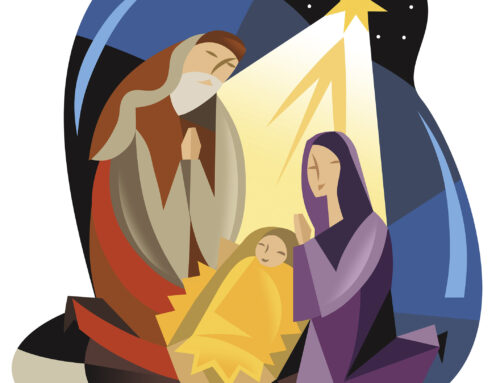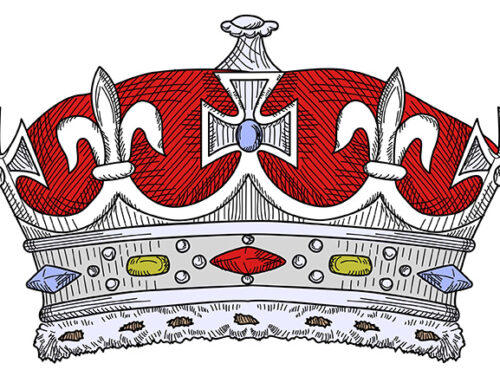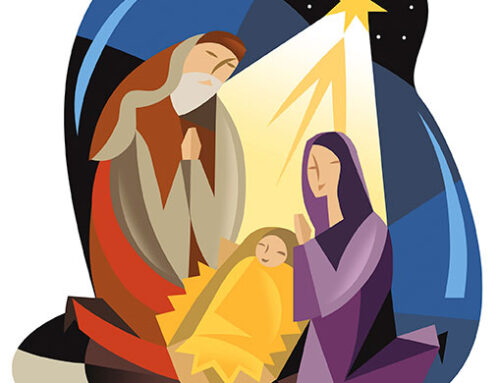 A famous instrumentalist was asked, “What is the most difficult instrument to play?” He replied, wisely, “Second violin.”
A famous instrumentalist was asked, “What is the most difficult instrument to play?” He replied, wisely, “Second violin.”
Not all of us have the leading part, but each one of us has a part to play; and this part is just as important as the others.
One of my unsung Bible heroes is a man that held on to his position, and his followers, loosely. He stepped out of the limelight with dignity and inner strength. In the Gospel of Luke, 1:57-80, we read of the birth of a baby destined to be number two. Would you please take a few minutes to read this passage?
“I” becomes less significant when one clearly understands identity (Luke 1:57-66).
 At this point in his Gospel account, Luke gives attention to Zechariah and Elizabeth. God’s promise of a son was fulfilled with John’s birth as an occasion for rejoicing with neighbours and relatives. According to the law, all male children were to be circumcised on the eighth day. Apparently, the practice was to name the child at this ceremony. A boy did not normally take his father’s name, but in this case the visitors thought it would be appropriate to name the child Zechariah. Elizabeth, however, indicated that such was not to be the case. The boy’s name was to be John.
At this point in his Gospel account, Luke gives attention to Zechariah and Elizabeth. God’s promise of a son was fulfilled with John’s birth as an occasion for rejoicing with neighbours and relatives. According to the law, all male children were to be circumcised on the eighth day. Apparently, the practice was to name the child at this ceremony. A boy did not normally take his father’s name, but in this case the visitors thought it would be appropriate to name the child Zechariah. Elizabeth, however, indicated that such was not to be the case. The boy’s name was to be John.
Unwilling to accept Elizabeth’s declaration, they appealed to Zechariah. He was still unable to speak [as the angel Gabriel had told him this would happen since he did not believe God’s promise of a son]. To everyone’s amazement Zechariah wrote, “His name is John.” Zechariah declared that the baby already had a name—given by God, which means “Lord is gracious.”
It was vitally important to Zechariah and Elizabeth, then later to John, what his name was. His identity was shaped by God’s destiny for him.
Did you know that if you have accepted Jesus Christ as your Lord and Saviour, you have been given a new name? He has high hopes for you! Jesus promises you a new identity!
“I” becomes less significant when one clearly understands image (Luke 1:67-75).
 The big picture, or image, of God’s great plan is painted in Luke chapter one. The heart of the Father is for those He has created. It was very important that John’s parents, and John, understood this.
The big picture, or image, of God’s great plan is painted in Luke chapter one. The heart of the Father is for those He has created. It was very important that John’s parents, and John, understood this.
Once he was able to speak again, Zechariah’s lips poured out a stream of joyous praise. Since Mary’s visit, Zechariah knew that she was to become the mother of the Messiah. It is evident in these verses that he was speaking of Jesus, rather than John—for John was from the tribe of Levi, not a descendant of David. While his listeners thought the Messiah came to bring salvation from Roman oppression, the Holy Spirit inspired Zechariah to speak about a much deeper, eternal and spiritual salvation.
Zechariah and his son John were messengers who gave little thought to their own importance.
Instead of being preoccupied with your image—how you see things and how you appear to others—capture the image from God’s perspective. See the big picture of His purpose for this world. It is to this relationship that all our priorities of time, energy and money must point.
“I” becomes less significant when one clearly understands intention (Luke 1:76-80).
 Having sung of the wonderful salvation God is offering, Zechariah turns to the part his son would play in all this. There was a mission [an intention] for his son to fulfill. Although the people had looked for the coming Messiah a long time, it turned out Jesus would not be the kind of Messiah they had anticipated. His would be a spiritual kingdom. To prepare the people for such a kingdom it was necessary for someone to go before Him. It was John, Zechariah’s son, who would have this crucial task.
Having sung of the wonderful salvation God is offering, Zechariah turns to the part his son would play in all this. There was a mission [an intention] for his son to fulfill. Although the people had looked for the coming Messiah a long time, it turned out Jesus would not be the kind of Messiah they had anticipated. His would be a spiritual kingdom. To prepare the people for such a kingdom it was necessary for someone to go before Him. It was John, Zechariah’s son, who would have this crucial task.
John the Baptist demonstrates later that he knew his intention [his purpose in life] and that he had prepared for it. He was called to make straight the way for the Lord (John 1:23)—to point people to Jesus. In John 3:30, John the Baptist describes his place as second fiddle in the kingdom of heaven. “He must become greater; I must become less.”
Do you know where you are going? Do you know what your intention, your purpose in life is? If you do not, I strongly encourage you to find out. If you allow God’s purpose for you to really grip your heart you will never be the same again!
Churches and individuals begin to die when they focus on themselves. To find fulfilment and happiness our focus must not be on ourselves, but rather on loving the Lord and loving others.
Like John the Baptist, we are called to play second fiddle. This grand purpose of God is not about you or me—it’s about Jesus. He wants to reveal Himself to people in a life-changing way; and He has called us to play a part in this.
“I” becomes less significant when one clearly understands identity, image and intention. Knowing and accepting one’s place in God’s grand scheme is a step toward contentment.

Allan Pole
CESLM President
al@eslcooperative.ca































































Thank you, also reminds me that in my church my goal can be to support the ministries of others and make them look good rather than hoping I have a role where I can shine.